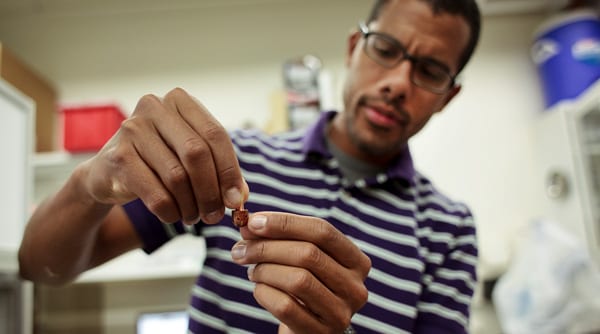 The UWM RET Program offers an intensive seven week summer experience for 10 teachers per year beginning in late June and ending in early August. The teachers participate in highly structured, team-oriented research projects focused on the water-energy nexus research theme and academic-year curricular development activities. To provide support beyond the classroom, the program will also engage school principals. The teachers’ professional development will include a Design Thinking boot camp, curriculum design mentoring, and avatar classroom training. Two RET network conferences will be held annually in which the teachers present their research projects and develop academic-year curriculum. During the first semester of the academic year, the teachers will implement the in-depth six- to eight-week curricular modules that they developed during the summer. The RET site and its activities directly align with the Milwaukee Public Schools District’s Comprehensive Math and Science Plan. It will be evaluated in quantitatively terms of participation, impact on students’ knowledge and interest in engineering careers, and their mastery of core science concepts that are targeted by the Design Based Learning (DBL) units. By focusing on the water-energy nexus, a topic of broad social impact that is attractive to high school students, it is hoped that the serious economic issues in Milwaukee related to the continuous decline in the number of K-12 students (particularly females and under-represented minorities) who pursue STEM careers will be addressed.
The UWM RET Program offers an intensive seven week summer experience for 10 teachers per year beginning in late June and ending in early August. The teachers participate in highly structured, team-oriented research projects focused on the water-energy nexus research theme and academic-year curricular development activities. To provide support beyond the classroom, the program will also engage school principals. The teachers’ professional development will include a Design Thinking boot camp, curriculum design mentoring, and avatar classroom training. Two RET network conferences will be held annually in which the teachers present their research projects and develop academic-year curriculum. During the first semester of the academic year, the teachers will implement the in-depth six- to eight-week curricular modules that they developed during the summer. The RET site and its activities directly align with the Milwaukee Public Schools District’s Comprehensive Math and Science Plan. It will be evaluated in quantitatively terms of participation, impact on students’ knowledge and interest in engineering careers, and their mastery of core science concepts that are targeted by the Design Based Learning (DBL) units. By focusing on the water-energy nexus, a topic of broad social impact that is attractive to high school students, it is hoped that the serious economic issues in Milwaukee related to the continuous decline in the number of K-12 students (particularly females and under-represented minorities) who pursue STEM careers will be addressed.

Objective: The long-term goal of this NSF RET Site is to build and support a sustainable scalable RET network of schools, principals, teachers, and industrial partners working together to transform STEM education in Milwaukee, connecting students’ passions and aspirations with exciting opportunities to make a difference through research, engineering, and manufacturing innovation. It is expected that new curricula and school-wide transformations will have an impact on 5,000-10,000 students from high-need urban public high schools in the city of Milwaukee. The aim is to catalyze a sustainable RET network that empowers teachers to experiment and make STEM learning exciting, grants principals and administration license to support these experiments (and experiment themselves), and, through the industrial element of the program, build the kind of partnerships that would make learning more contextual and help support program growth.
Teachers (RET Fellows): Our program seeks high school science and mathematics teachers from Milwaukee-area schools, with particular consideration given to teachers working in districts that serve a significantly diverse socioeconomic and demographic population. Teachers in such districts typically face strong challenges concerning motivation and skill level in students’ learning main concepts in science and mathematics. Teachers in the areas of Chemistry, Physics, Earth Sciences, Mathematics, and Generalized Physical Science are eligible to apply. Teachers must be highly motivated and open to trying new approaches to student engagement and curricula based on sound learning science practices and cutting-edge engineering research experiences. Teachers must also complete the summer program, academic year workshops, enter student teams in an end-of-year poster competition, and present results of this experience at the WSST conference. Teachers will be compensated for their involvement and time.
Program Schedule:
- Phase 1: Six-week full-time summer research experience (June 27 – August 5, 2022)
- Phase 2: New curriculum implementation (2022-2023 academic year)
- Phase 3: Participation in WSST or other state science/math conference (Spring, 2023)
Financial Considerations: Teachers will receive a stipend of $7,500 for successful participation in the program for one year. This includes the summer sessions, the year-long professional development sessions, and the poster competition. Up to $2,000 will be available for each participant to purchase classroom supplies and teaching materials. An additional $500 stipend will be paid for mandatory presentation at the WSST conference. Payments will be made in installments.
Disclaimer
Any opinions, findings, and conclusions or recommendations expressed in this material are those of the author(s) and do not necessarily reflect the views of the National Science Foundation. This material is based upon work supported by the National Science Foundation under NSF Grant No.1801499.